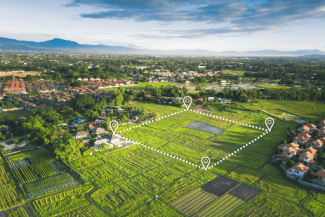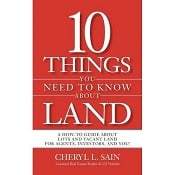5 Reasons Why Buying Raw Land for Your Real Estate Portfolio is Not That Scary
By Cheryl L. Sain, author of 10 Things You Need to Know About Land
Learning how to properly and quickly research any property can open the door to different investment opportunities such as raw land that you may not be familiar with. Once you know what to do you will have peace of mind and comfort moving forward when new opportunities come your way.
Below are 5 initial areas you will want to take into consideration:
-

- Confirm utility locations and available capacity such as where the water and sewer are in relation to the property which can make a property even more valuable. Talk to the county or town’s utility department.
- Understand the current zoning and potential rezoning of a property prior to a purchase. Talk to the county’s zoning department. What if you found a property that has an old house or building that could be torn down and now be rezoned for a multifamily site? Wouldn’t that be a great investment?
- First, review the seller’s most current survey on hand to understand the property layout. However, have your own survey performed during due diligence for peace of mind. You may uncover hidden red flags (or opportunities) not visible to the naked eye. Hire a licensed professional land surveyor. DO NOT use the current survey provided by the seller, get your own. I cannot stress this enough.
- Think outside the box, raw land can be utilized for income-producing opportunities depending on its size, such as timber, hunting, camping, or farming. Or if feasible, just buy and hold and wait for the town’s growth to catch up. Remember to investigate the future land use plan for the town, this may help you to make the decision to move forward with a purchase.
Understanding the things you need to know about any property is vital in the investment world. To learn more about these “THINGS” check out my book 10 Things You Need to Know About Land. This book was written initially for the real estate agent that doesn’t understand land, but it is also a great book for anyone that wants to buy or sell property.
Now that we have hit on a few things to consider, don’t let opportunities pass you buy because you are afraid of what you don’t know, because now you can know what to do and where to find the important information. Good wishes to you on your first or next land purchase.
About the Author:


Often, the residential real estate professionals believed and were told “land deals are too complicated and difficult to understand.” Many were told to just “refer it to the land guy in the office.” But she realized they just didn’t know what they didn’t know, and no one was teaching it to them, and so this book was born.
10 Things You Need to Know About Land is Cheryl’s way of helping others learn in a short amount of time what took her years to learn.
Her goal is to make this information easy to read and understand in order to gain the basic knowledge needed to engage in lots and land transactions. After all, most houses sit on land, shouldn’t we know as much about that property as possible? We owe it to our clients. Step out of your box and learn what you need to. You might become the next “land guy or lady in the office.”















 Accessibility
Accessibility